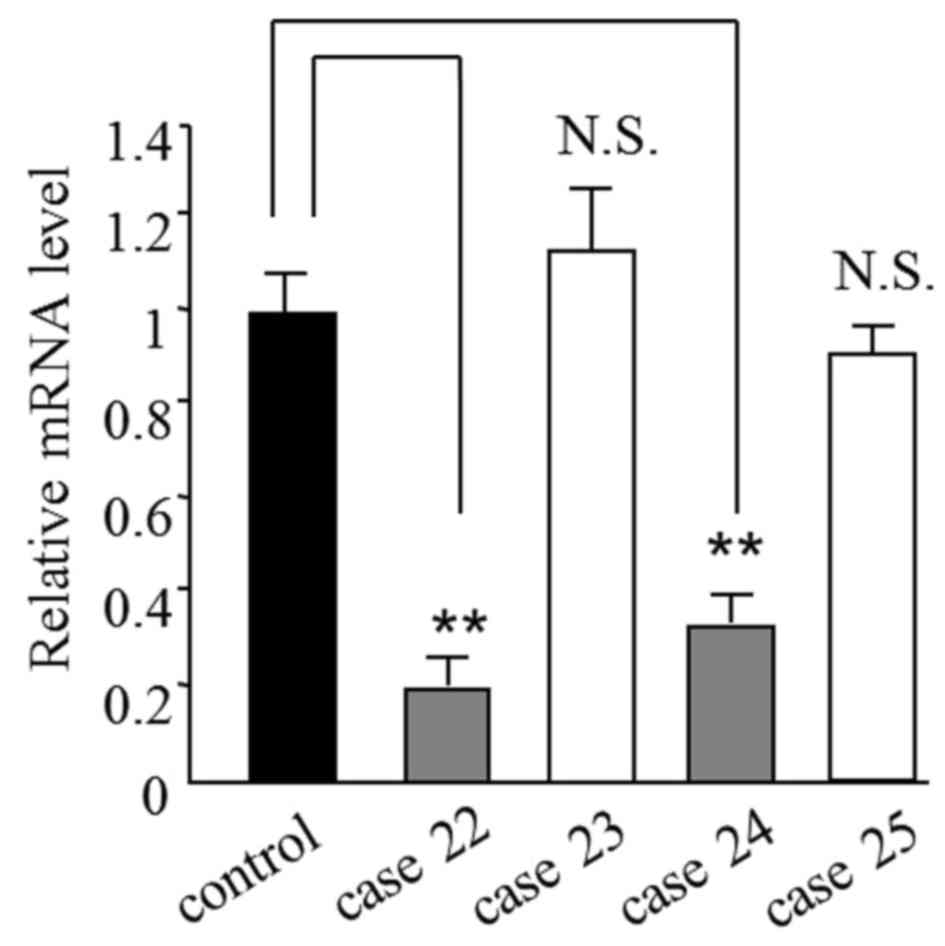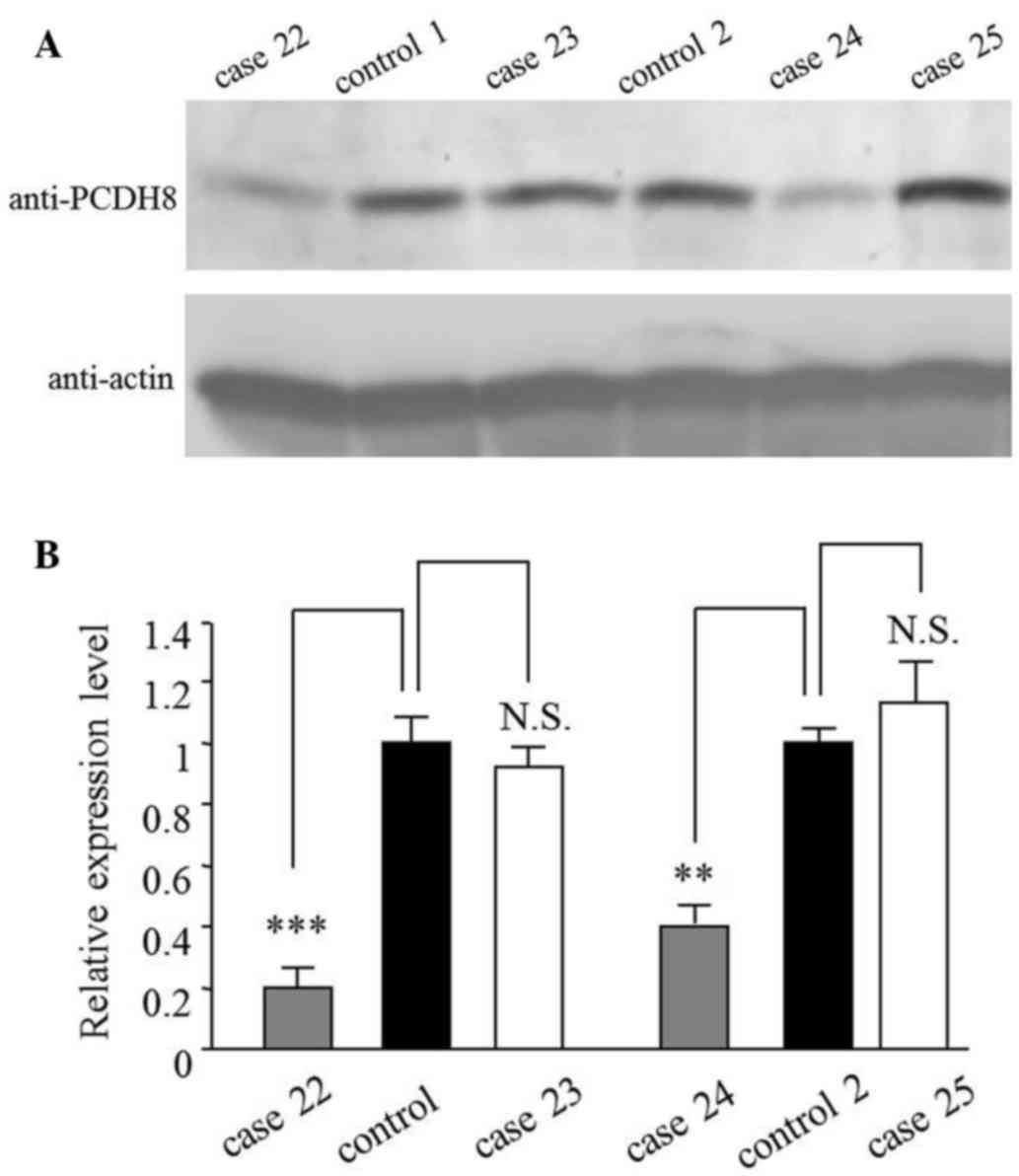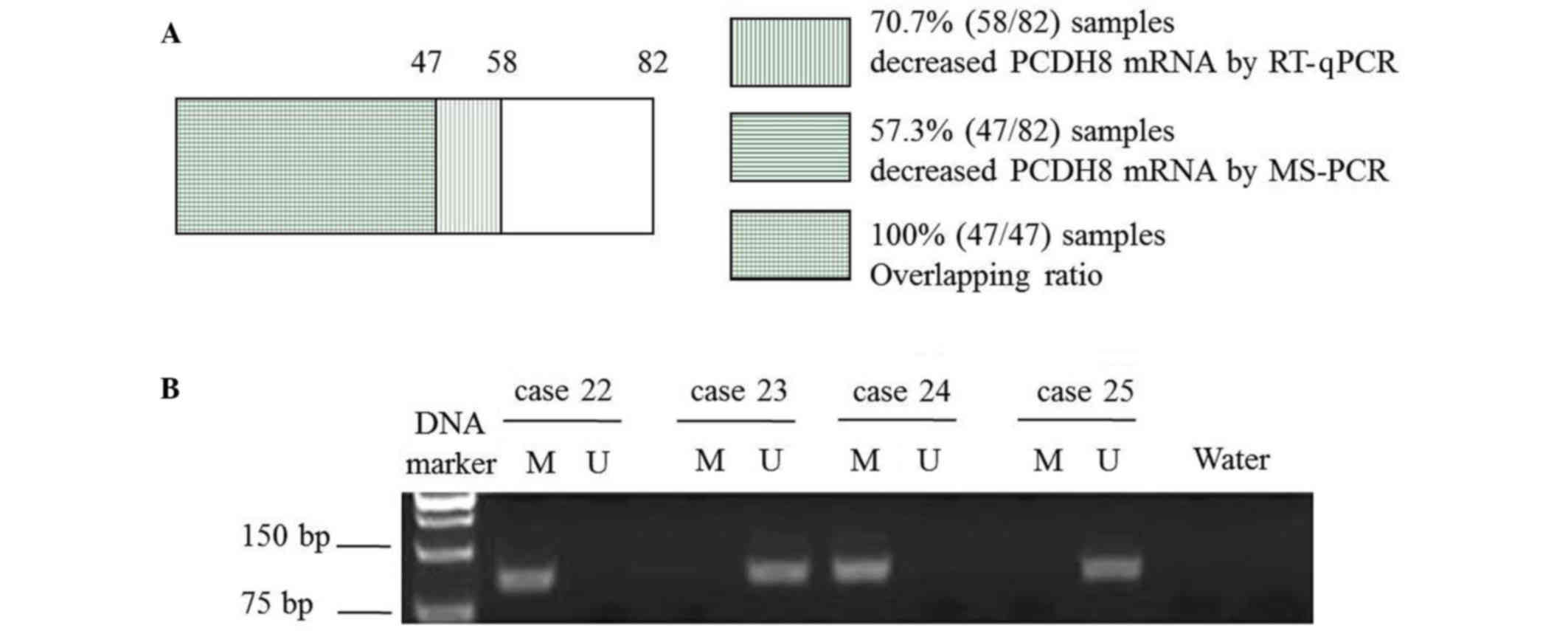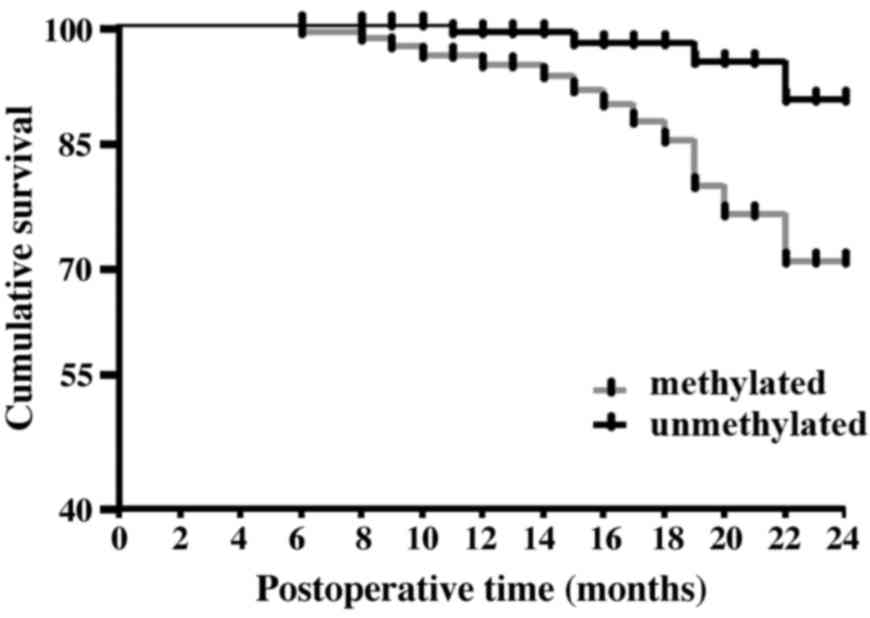|
1
|
Javanmard B, Haddad A Hassanzadeh,
Yaghoobi M and Lotfi B: Diode laser ablation of prostate and
channel transurethral resection of prostate in patients with
prostate cancer and bladder outlet obstruction symptoms. Urol J.
11:1788–1792. 2014.PubMed/NCBI
|
|
2
|
Park JY: Promoter hypermethylation in
prostate cancer. Cancer Control. 17:245–255. 2010.PubMed/NCBI
|
|
3
|
Deaton AM and Bird A: CpG islands and the
regulation of transcription. Genes Dev. 25:1010–1022. 2011.
View Article : Google Scholar : PubMed/NCBI
|
|
4
|
Morris MR, Ricketts CJ, Gentle D, McRonald
F, Carli N, Khalili H, Brown M, Kishida T, Yao M, Banks RE, et al:
Genome-wide methylation analysis identifies epigenetically
inactivated candidate tumour suppressor genes in renal cell
carcinoma. Oncogene. 30:1390–1401. 2011. View Article : Google Scholar : PubMed/NCBI
|
|
5
|
Yu JS, Koujak S, Nagase S, Li CM, Su T,
Wang X, Keniry M, Memeo L, Rojtman A, Mansukhani M, et al: PCDH8,
the human homolog of PAPC, is a candidate tumor suppressor of
breast cancer. Oncogene. 27:4657–4665. 2008. View Article : Google Scholar : PubMed/NCBI
|
|
6
|
Zhang D, Zhao W, Liao X, Bi T, Li H and
Che X: !, !Frequent silencing of protocadherin 8 by promoter
methylation, a candidate tumor suppressor for human gastric cancer.
Oncol Rep. 28:1785–1791. 2012.PubMed/NCBI
|
|
7
|
Lin YL, Ma JH, Luo XL, Guan TY and Li ZG:
Clinical significance of protocadherin-8 (PCDH8) promoter
methylation in bladder cancer. J Int Med Res. 41:48–54. 2013.
View Article : Google Scholar : PubMed/NCBI
|
|
8
|
Welch HG and Albertsen PC: Prostate cancer
diagnosis and treatment after the introduction of prostate-specific
antigen screening: 1986–2005. J Ntl Cancer Inst. 101:1325–1329.
2009. View Article : Google Scholar
|
|
9
|
Partin AW, Mangold LA, Lamm DM, Walsh PC,
Epstein JI and Pearson JD: Contemporary update of prostate cancer
staging nomograms (Partin Tables) for the new millennium. Urology.
58:843–848. 2001. View Article : Google Scholar : PubMed/NCBI
|
|
10
|
Ugolkov AV, Eisengart LJ, Luan C and Yang
XJ: Expression analysis of putative stem cell markers in human
benign and malignant prostate. Prostate. 71:18–25. 2011. View Article : Google Scholar : PubMed/NCBI
|
|
11
|
Barfeld SJ, East P, Zuber V and Mills IG:
Meta-analysis of prostate cancer gene expression data identifies a
novel discriminatory signature enriched for glycosylating enzymes.
BMC Med Genomics. 7:5132014. View Article : Google Scholar : PubMed/NCBI
|
|
12
|
Tong SJ, Liu J, Wang X and Qu LX:
microRNA-181 promotes prostate cancer cell proliferation by
regulating DAX-1 expression. Exp Ther Med. 8:1296–1300.
2014.PubMed/NCBI
|
|
13
|
Livak KJ and Schmittgen TD: Analysis of
relative gene expression data using real-time quantitative PCR and
the 2−ΔΔCT method. Methods. 25:402–408. 2001. View Article : Google Scholar : PubMed/NCBI
|
|
14
|
Frank SJ, Levy LB, van Vulpen M, Crook J,
Sylvester J, Grimm P, Pugh TJ and Swanson DA: Outcomes after
prostate brachytherapy are even better than predicted. Cancer.
118:839–847. 2012. View Article : Google Scholar : PubMed/NCBI
|
|
15
|
Monma F, Hozumi Y, Ikematsu S, Kawaguchi
M, Kadomatsu K and Suzuki T: Expression of midkine in normal human
skin, dermatitis and neoplasms: Association with differentiation of
keratinocytes. J Dermatol. 40:980–986. 2013. View Article : Google Scholar : PubMed/NCBI
|
|
16
|
Tangen CM, Faulkner JR, Crawford ED,
Thompson IM, Hirano D, Eisenberger M and Hussain M: Ten-year
survival in patients with metastatic prostate cancer. Clin Prostate
Cancer. 2:41–45. 2003. View Article : Google Scholar : PubMed/NCBI
|
|
17
|
Jennbacken K, Vallbo C, Wang W and Damber
JE: Expression of vascular endothelial growth factor C (VEGF-C) and
VEGF receptor-3 in human prostate cancer is associated with
regional lymph node metastasis. Prostate. 65:110–116. 2005.
View Article : Google Scholar : PubMed/NCBI
|
|
18
|
Sheyhidin I, Hasim A, Zheng F and Ma H:
Epigenetic changes within the promoter regions of antigen
processing machinery family genes in Kazakh primary esophageal
squamous cell carcinoma. Asian Pac J Cancer Prev. 15:10299–10306.
2014. View Article : Google Scholar : PubMed/NCBI
|
|
19
|
Yu JS, Koujak S, Nagase S, Li CM, Su T,
Wang X, Keniry M, Memeo L, Rojtman A, Mansukhani M, et al: PCDH8,
the human homolog of PAPC, is a candidate tumor suppressor of
breast cancer. Oncogene. 27:4657–4665. 2008. View Article : Google Scholar : PubMed/NCBI
|
|
20
|
Bray NJ, Kirov G, Owen RJ, Jacobsen NJ,
Georgieva L, Williams HJ, Norton N, Spurlock G, Jones S, Zammit S,
et al: Screening the human protocadherin 8 (PCDH8) gene in
schizophrenia. Genes Brain Behav. 1:187–191. 2002. View Article : Google Scholar : PubMed/NCBI
|
|
21
|
Létoquart J, Huvelle E, Wacheul L,
Bourgeois G, Zorbas C, Graille M, Heurgué-Hamard V and Lafontaine
DL: Structural and functional studies of Bud23-Trm112 reveal 18S
rRNA N7-G1575 methylation occurs on late 40S precursor ribosomes.
Proc Natl Acad Sci USA. 111:pp. E5518–E5526. 2014; View Article : Google Scholar : PubMed/NCBI
|
|
22
|
Heichman KA and Warren JD: DNA methylation
biomarkers and their utility for solid cancer diagnostics. Clin
Chem Lab Med. 50:1707–1721. 2012. View Article : Google Scholar : PubMed/NCBI
|
|
23
|
Redshaw N, Huggett JF, Taylor MS, Foy CA
and Devonshire AS: Quantification of epigenetic biomarkers: An
evaluation of established and emerging methods for DNA methylation
analysis. BMC Genomics. 15:11742014. View Article : Google Scholar : PubMed/NCBI
|
|
24
|
LePage DP, Jernigan KK and Bordenstein SR:
The relative importance of DNA methylation and Dnmt2-mediated
epigenetic regulation on Wolbachia densities and cytoplasmic
incompatibility. PeerJ. 2:e6782014. View Article : Google Scholar : PubMed/NCBI
|
|
25
|
Peng L, Wei H and Liren L: Promoter
methylation assay of SASH1 gene in hepatocellular carcinoma. J
BUON. 19:1041–1047. 2014.PubMed/NCBI
|
|
26
|
Jeffries MA and Sawalha AH: Autoimmune
disease in the epigenetic era: How has epigenetics changed our
understanding of disease and how can we expect the field to evolve?
Expert Rev Clin Immunol. 11:45–58. 2015. View Article : Google Scholar : PubMed/NCBI
|
|
27
|
Sircar K, Huang H, Hu L, Cogdell D,
Dhillon J, Tzelepi V, Efstathiou E, Koumakpayi IH, Saad F, Luo D,
et al: Integrative molecular profiling reveals asparagine
synthetase is a target in castration-resistant prostate cancer. Am
J Pathol. 180:895–903. 2012. View Article : Google Scholar : PubMed/NCBI
|
|
28
|
Yi JM, Dhir M, Guzzetta AA,
Iacobuzio-Donahue CA, Heo K, Yang KM, Suzuki H, Toyota M, Kim HM
and Ahuja N: DNA methylation biomarker candidates for early
detection of colon cancer. Tumour Biol. 33:363–372. 2012.
View Article : Google Scholar : PubMed/NCBI
|


















